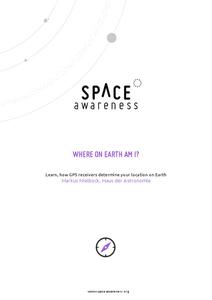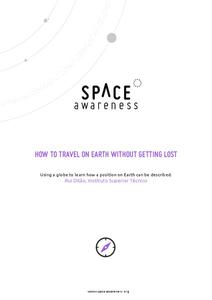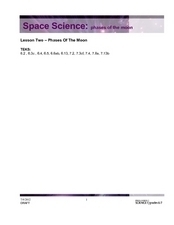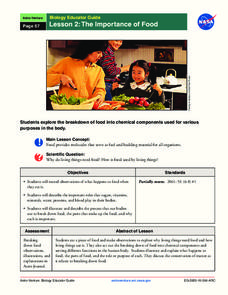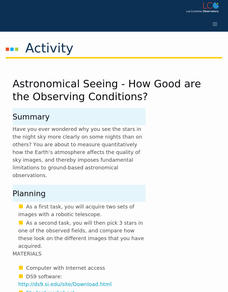Curated OER
There Are So Many Stars
Students explore the night sky. In this astronomy lesson, students discover a song about the stars in the sky and participate in a flannel board activity pertaining to the song.
Curated OER
Charting The Planets
Young scholars conduct different activities in order to unlock the secrets of the universe. They answer different questions that are written to assess knowledge of the planets. Information can be found on the internet to help.
Curated OER
Kids in Outer Space
Students explore outer space through various activities. In this outer space lesson plan, students read the book Outer Space and The Mice on the Moon. Students work in groups to build their own space ships.
University of Colorado
Astro-Chronology
Class members play a version of the game Chronology to determine when certain scientific events occurred in history. Teams play until someone has 5-10 events in the correct order.
Space Awareness
Where on Earth Am I?
Almost every phone has GPS installed, but a large number of teens don't know how the technology works. An initial activity illustrates how GPS determines a location on Earth. Scholars then apply trilateration procedures to a...
Curated OER
Moon Mining
Go on a moon mining expedition from the safety of your classroom with this space exploration simulation. Using simple models of the moon's surface prepared ahead of time by the teacher, young scientists are challenged with locating and...
Space Awareness
How To Travel On Earth Without Getting Lost
Have you ever wanted to travel the world? Take a virtual trip with a geography lesson that uses longitude and latitude, the position of the sun, an astronomy app, and a classroom globe.
Curated OER
SUNSPOTS SPOTTED
Students study sunspots and their motion, from data gathered, they determine the significance of the sunspot data. The data be used to calculate the rotational period of the sun. They draw conclusions as to the sunspot's impact on the...
Curated OER
Astronomy: Earth/Moon
Students investigate the Earth and the Moon. They select activities from a menu of options including viewing videos, drawing magnetic fields and plate tectonics, creating vocabulary flashcards, observing the phases of the moon over a...
Curated OER
What is the Nature of Science?
Conduct a survey about the nature of science with your high schoolers. They will record their responses in a table and then discuss the implications of scientific theory. Note: There are activity sheets, and forms included with this...
Curated OER
Space Science: Phases of the Moon
Looking for a terrific lesson on the phases of the moon that has lots of good worksheets? With two excellent websites are embedded in the plan, the activity is sure to spark some interest in your astronomy unit. Some common...
NASA
The Importance of Food
Pupils make observations while eating food. They act out the process of food breaking down in the body and the roles of various chemical components, such as sugar and protein. It concludes with an activity illustrating the process and a...
Curated OER
How Do Astronomers Measure Distances to Stars?
In this astronomy instructional activity, students participate in an activity using the parallax effect to measure star distances. They record their information in a data table then complete 5 fill in the blank conclusion questions.
Curated OER
Islamic Scientific Contributions to Civilization
Seventh graders explore several well documented artistic and scientific accomplishments that were discovered or perfected during The Golden Age of Islam. They are staff writers of a magazine who create a feature article about a topic...
Curated OER
History of Saturn Discoveries
Students interpret how scientists have explored Saturn. In this NASA based astronomy lesson, students create a timeline depicting the study of Saturn from 1610 until 2010. Each student will write a letter to Galileo discussing how the...
NASA
Collecting Electromagnetic Radiation
Astronomy is literally over your head, but this lesson will explain how we study it. Young scientists make telescopes, calculate and compare the light gathering power of lenses, and simulate detection of infared radiation. Materials...
NASA
States of Matter
Water, one of the basic needs of humans, is found in all three states of matter on Earth; no other planet—that we know of—possesses this quality. Here is a unit that allows learners to explore through experimentation what it takes to...
Curated OER
Astronomy
Students complete a unit of lessons on our solar system, its stars, and astronomers. They record information in a space journal, design constellations, define key vocabulary, observe the phases of the moon, and create a group planet...
K12 Reader
A Planet in the Solar System
Take young scientists on an exploration of the cosmos with this cross-curricular writing exercise. Tasked with producing an expository composition describing a planet of their choosing, students perform research and present their...
Research Parent
Universe Cards
A 9-page packet comes with 24 cards that have pictures and informational text about each object in the universe. From nebulae to dwarf planets, objects we see—or don't see—are represented in the cards through pictures and words.
Glynn County School System
Cosmology
The past, the present, and the future ... there's so much to discover about the galaxy. Scholars learn about the creation of the universe, its current structure, and how it is changing. The PowerPoint presentation begins with a...
American Museum of Natural History
What Do You Know About Stars?
Illuminate the information about stars. Pupils respond to 10 multiple choice questions about stars. The questions cover topics such as the size of the Milky Way Galaxy, the Sun, and the life cycle of a star. The resource works as a...
Las Cumbres Observatory
Astronomical Seeing - How Good Are the Observing Conditions?
Why is star gazing easy on some nights and difficult on others? Pupils aim to quantify the answer in an enlightening astronomy lesson. After collecting images from an online robotic telescope, they measure the brightness of images using...
Curated OER
The Universe in a Different Light
Students become aware of some of the objects studied in, and concepts associated with, high-energy astronomy. They do this by participating in card games that teach and review these concepts.






